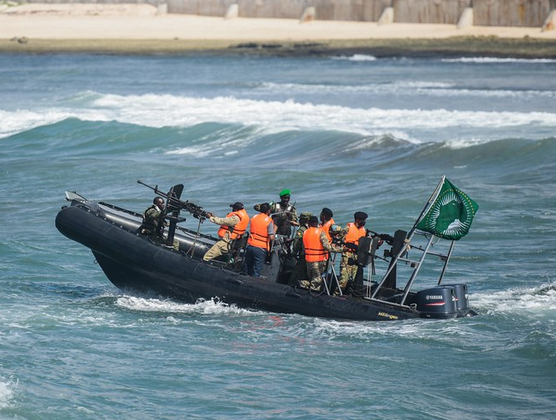In a combined initiative conducted by the African Union Transition Mission in Somalia (ATMIS) and the European Union Capacity Building Mission in Somalia (EUCAP Somalia), fifteen Somalia Navy and Coast Guard (SNCG) officers successfully completed specialised maritime security training.
The two-week workshop, which included both theoretical and practical practise, sought to assist Somalia in securing the longest coastline in Africa – 3 025 km – ahead of the withdrawal of 2,000 ATMIS troops by 30 June 2023.
“This refresher training is in line with the goals in the Somalia Transition Plan and ATMIS mandate, specifically as regards mentorship and capacity building of Federal Government of Somalia (FGS) institutions across all domains,” said Major General Peter Muteti, ATMIS Deputy Force Commander responsible for support and logistics.
At the conclusion of the training, he stated that it was a key milestone in ongoing efforts to strengthen Somali institutions in readiness for the gradual transition of security responsibilities to Somali Security Forces (SSF) in accordance with UN Security Council resolutions.
“Capacity building of the SNCG is critical to enable maritime law enforcement, search and rescue (SAR), and coastal defence while securing sea lanes and protecting against illegal, unreported, and unregulated (IUU) fishing, hazardous waste dumping, and other crimes,” Muteti added.
Somalia has the longest coastline in Africa, stretching over 3,000 km, and is rich in ocean-based resources. It is exploited by illicit fisherman and smugglers, and the country will require a well-trained and equipped navy to truly benefit from a ‘blue economy,’ according to an ATMIS statement.
ATMIS, EUCAP, and the United Nations (UN) in Somalia have assisted the country’s maritime security sector over the years through mentoring, capacity development, training, logistics, and strategic level advise based on coast guard functions, among other things.
Among the courses taken by the trainees were maritime safety, marine mechanics, coast guard tasks, maritime law, first aid, and communication protocols.
“The training served its purpose,” said Major Matthew Achiga, ATMIS Maritime Commander, “because the trainees can now demonstrate understanding of maritime domain awareness, boat handling, and a basic understanding of boat troubleshooting.”

